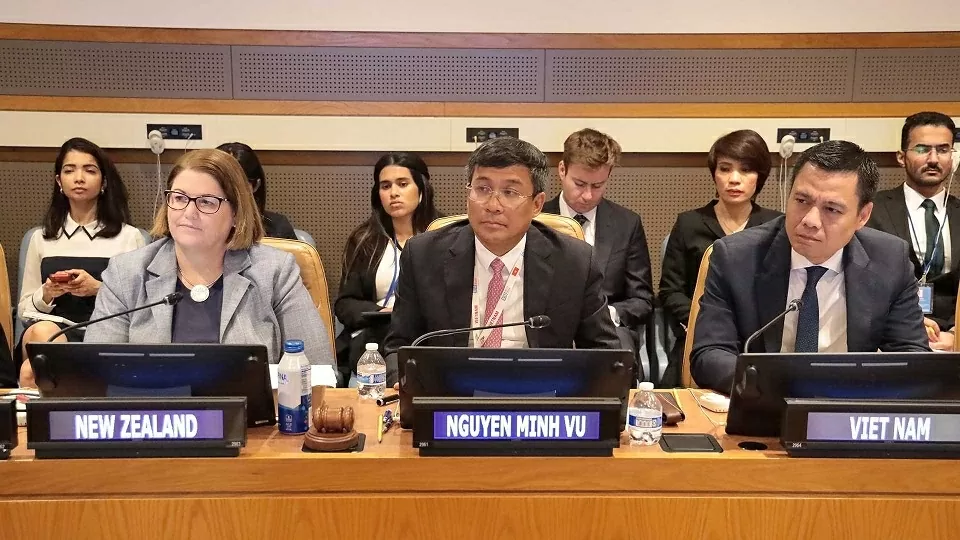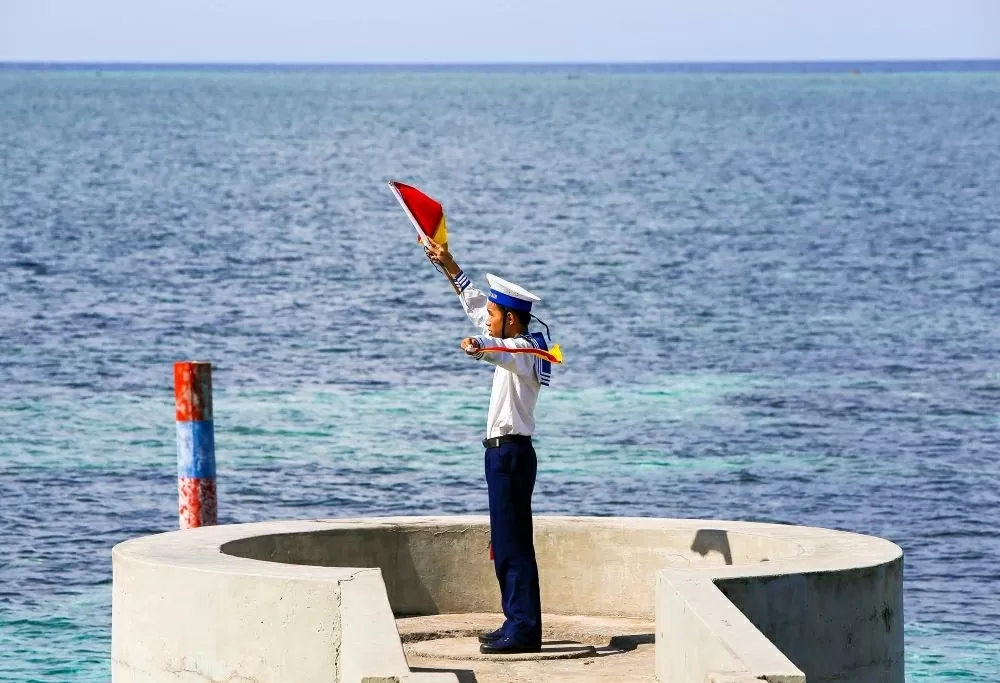
UNCLOS 1982 – the 'backbone' for Vietnam in formulating maritime policies and legal frameworks
Latest
 |
| Standing Deputy Foreign Minister Nguyen Minh Vu chaired the International Workshop and Annual Meeting of the UNCLOS Friends Group in March 2025. (Photo: Vietnam Mission to the United Nations) |
After more than nine years of negotiations during the Third United Nations Conference on the Law of the Sea, the 1982 United Nations Convention on the Law of the Sea (UNCLOS) was adopted and officially entered into force in 1994.
Since then, UNCLOS has been widely recognized by the international community as the “Constitution of the seas and oceans.” It is considered the most important multilateral international treaty on maritime affairs—a comprehensive and unified legal instrument governing all issues related to the maritime domain.
Promoting Integrity and Universal Values
As a coastal state that recognizes the vital importance of the sea for national security and sustainable economic development, Vietnam was among the first 107 countries to sign UNCLOS and the 63rd to ratify it before the Convention officially entered into force.
On June 23, 1994, the National Assembly of Vietnam adopted a Resolution ratifying the 1982 UNCLOS, “expressing our determination to join the international community in building a fair legal order, and promoting development and cooperation at sea."
Vietnam consistently upholds and affirms the significance, integrity, and universal value of UNCLOS, and fully and responsibly adheres to its provisions.
Firstly, UNCLOS is the only international treaty explicitly mentioned in the documents of the Party Congress of Vietnam. It serves as a foundation for Vietnam to continue formulating policies and improving its national legal system related to seas and islands, aiming for sustainable development while meeting the requirements of safeguarding maritime sovereignty and ensuring compliance with international law, including UNCLOS.
In the Resolution ratifying UNCLOS, Vietnam set the objective of making "necessary amendments and supplements to relevant provisions of national law to be consistent with UNCLOS.
Based on this, the National Assembly passed the Law of the Sea of Vietnam on June 21, 2012, marking the first time the country had a comprehensive maritime law. This law is the most important and complete legal document addressing Vietnam's maritime issues, including the definition and legal status of maritime zones (such as internal waters, territorial sea, contiguous zone, exclusive economic zone, and continental shelf), as well as matters related to sea management and protection, marine economic development, international maritime cooperation, maritime patrol and control, and the handling of violations.
The 2012 Law of the Sea of Vietnam fundamentally incorporates and domesticates the provisions of UNCLOS.
Second, Vietnam maintains a consistent stance on maritime issues, upholding the spirit of the rule of law and viewing the Convention as the legal foundation for conducting activities at sea. This includes the peaceful resolution of maritime disputes with neighboring countries, with the goal of promoting peaceful and sustainable governance of maritime zones, including the East Sea (South China Sea).
Resolution 36-NQ/TW, dated October 22, 2018, by the 12th Party Central Committee on the Strategy for the Sustainable Development of Vietnam’s Marine Economy to 2030, with a vision to 2045, sets the overarching goal of transforming Vietnam into a strong maritime nation.
Flexible Application, Upholding the Principle of Fairness
In practice, Vietnam has flexibly applied the Convention in addressing maritime differences and disputes, successfully delimiting maritime boundaries with several neighboring countries. In these efforts, the principle of fairness has been emphasized to achieve reasonable and mutually acceptable solutions.
Vietnam signed the Agreement on Maritime Delimination with Thailand in 1997, and the Agreement on the Delimitation of the Gulf of Tonkin with China in 2000.
With Indonesia, Vietnam signed the Agreement on the Delimitation of the Continental Shelf in 2003 and completed negotiations on the delimitation of the Exclusive Economic Zone (EEZ) in 2022.
In addition, based on UNCLOS, Vietnam and several neighboring countries have engaged in various forms of regional cooperation. Notable examples include: The Joint Oceanographic and Marine Scientific Research Expedition in the South China Sea (JOMSRE-SCS) between Vietnam and the Philippines; the Tripartite Agreement for Joint Marine Seismic Undertaking (JMSU) involving oil and gas companies from China, the Philippines, and Vietnam.
The Agreement on Fisheries Cooperation between Vietnam and China in the Gulf of Tonkin—signed in 2000 and effective from 2004 until its expiration—is also recognized as a model for fisheries collaboration.
Another notable example of joint cooperation is the 1992 Joint Petroleum Development Agreement between Vietnam and Malaysia, under which the two sides agreed to conduct joint resource exploration in overlapping maritime areas, based on the principles of cost sharing and equal benefit distribution.
 |
| The UNCLOS Convention is a solid legal foundation for Vietnam to protect national interests. (Photo: QT) |
Third, Vietnam has been, is, and will continue to actively participate in various international forums on the law of the sea and ocean-related issues that are of global concern, such as climate change, marine debris, and biodiversity.
Notably, in 2020, Vietnam and Germany jointly initiated and co-chaired the establishment of the Group of Friends on the United Nations Convention on the Law of the Sea (UNCLOS). This initiative promotes dialogue on UNCLOS and cooperation on shared maritime issues. The Group now comprises more than 120 member countries, representing all geographical regions.
Vietnam also actively engages in institutional mechanisms established under the framework of UNCLOS. These include nominating arbitrators and conciliators, as well as recommending experts to the Legal and Technical Commission (LTC) of the International Seabed Authority (ISA).
For the first time, in 2024, Vietnam nominated a candidate for the position of judge at the International Tribunal for the Law of the Sea (ITLOS) for the 2026–2035 term.
In addition, Vietnam has actively participated in the implementation agreements under the UNCLOS framework, such as: The Agreement on the Implementation of Part XI of UNCLOS on the Area (since 2006), and the United Nations Fish Stocks Agreement (UNFSA) – formally titled the Agreement for the Implementation of the Provisions of the United Nations Convention on the Law of the Sea of 10 December 1982 relating to the Conservation and Management of Straddling Fish Stocks and Highly Migratory Fish Stocks (since 2018).
Vietnam was also actively involved in the negotiation of the Agreement on the Conservation and Sustainable Use of Marine Biodiversity in Areas Beyond National Jurisdiction (BBNJ), and was among the first countries to sign the agreement upon its opening for signature.
Furthermore, Vietnam has contributed to international legal discourse by participating in procedures seeking advisory opinions from both ITLOS and the International Court of Justice (ICJ) regarding states’ legal obligations in the context of climate change.
In February 2025, the Asia-Pacific Group of Member States at the United Nations unanimously nominated Vietnam to serve as Chair of the 35th Meeting of the States Parties to UNCLOS (SPLOS), scheduled for June 2025.
This marks the first time Vietnam has held this position, reflecting the international community’s high regard and trust in Vietnam’s contributions to maritime governance. It also represents an opportunity for Vietnam to further affirm its role as a responsible and proactive UNCLOS member, actively contributing to the global effort for effective and sustainable governance of seas and oceans.









